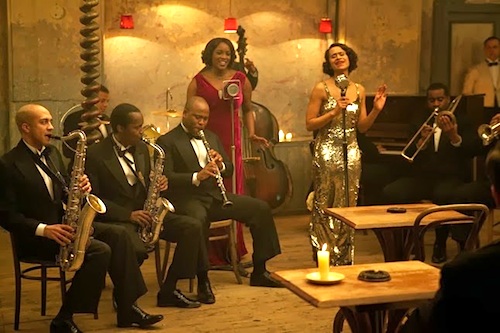By Joe Bendel. Louis Lester’s band swings so hard, many of their fans assume he is an American, but he is really a born and bred British subject. Several high society types will take an interest in them, but that will not always be a good thing during the course of Stephen Poliakoff’s Dancing on the Edge, a six night mini-series beginning this Saturday on Starz.
Stanley Mitchell is a progressive jazz fan, but he is also a bit of an operator. He sings the praises of the Lester band, hoping his magazine Music Express will rise with their tide. While not to the manor born himself, Mitchell knows many of the right people, like Arthur Donaldson, a man of leisure who happens to appreciate real deal jazz. Through Donaldson’s connections and Mitchell’s glad-handing, the Lester band books some high profile gigs, eventually becoming the house band at the formerly staid Imperial Hotel.
For a while, it seems like everyone will enjoy the good life together, especially when the mysterious American tycoon, Walter Masterson, starts inviting the band to his lavish parties, along with the wealthy but somewhat emotionally codependent Luscombe siblings. The interracial romance brewing between Lester and Sarah, a photographer close to the Luscombes, obviously portends future trouble, but the erratic Julian Luscombe’s reckless pursuit of the band’s lead singer will lead to more immediate problems.
Chiwetel Ejiofor is about to become an Oprah superstar through 12 Years a Slave, but his turn as Lester is arguably his best work since Dirty Pretty Things. In many ways, it is a treatise on “cool” as a defense strategy and a personal aesthetic. Rigidly controlled, Ejiofor still shows us all the gears turning in his head. Arguably, the major historical influences on his Lester are the suave sophistication of Ellington (whose 1930’s small big band could be a model for the Lester outfit) and the not-so-passive aggressive aloofness of Miles Davis to come in later years.
In contrast, Matthew Goode gives Mitchell a slightly manic edge, nicely playing off the tightly wound Ejiofor in their smartly written scenes together. (If you’re asking whether he rings to someone who has written about and championed jazz, the answer is yes.) Probably nobody is more over-exposed for Anglophiles than Tom Hughes right now, but while he was conspicuously miscast in About Time, The Hollow Crown, and The Lady Vanishes, he is sort of perfect for the boyishly creepy Julian Luscombe. Like Hughes, John Goodman brings out the messy human dimensions of grandly indulgent Masterson, a role that could have easily descended into gross caricature.

In fact, one of writer-director Poliakoff’s great strengths is the manner in which he preserves some degree of audience sympathy for all his characters despite their often horrid actions. Shrewdly, he also maintains considerable ambiguity regarding certain relationships, instead of beating viewers about the head, as a less artful production might. Dancing does right by the music as well, featuring a soundtrack of original era appropriate swingers and ballads, recorded by real life working jazz and studio musicians, who also appear in character as the Lester band. If jazz advocates will have any gripe with Dancing it will be the lack of development for the musicians, besides Lester and his two vocalists.
Like the best of television, Dancing quickly hooks in viewers and keeps them emotionally invested throughout. Poliakoff captures the exhilaration of the after-hours jam, but also incorporates pointed references to the ominous rise of National Socialism, Britain’s lack of military preparedness, and the rather dubious character of the future temporary Edward VIII.
Nicely crafted in all respects, Dancing on the Edge is recommended for fans of swing music and British television when it premieres this Saturday (10/19) on Starz. As a note, the fifth installment is technically the finale, but an epilogue follows the next week (11/23), which purports to collect Mitchell’s aborted interviews with Lester. Initially, it seems to be a DVD-extra kind of thing, but it might conceivably set up a sequel series in its final moments.
LFM GRADE: A-
Posted on October 17th, 2013 at 9:49am.